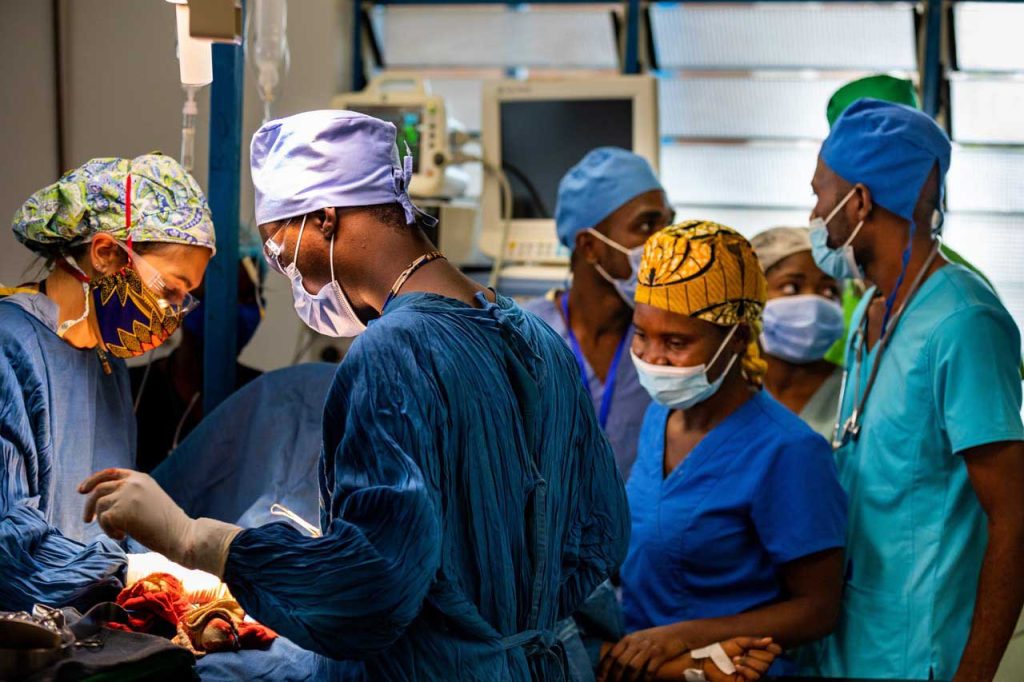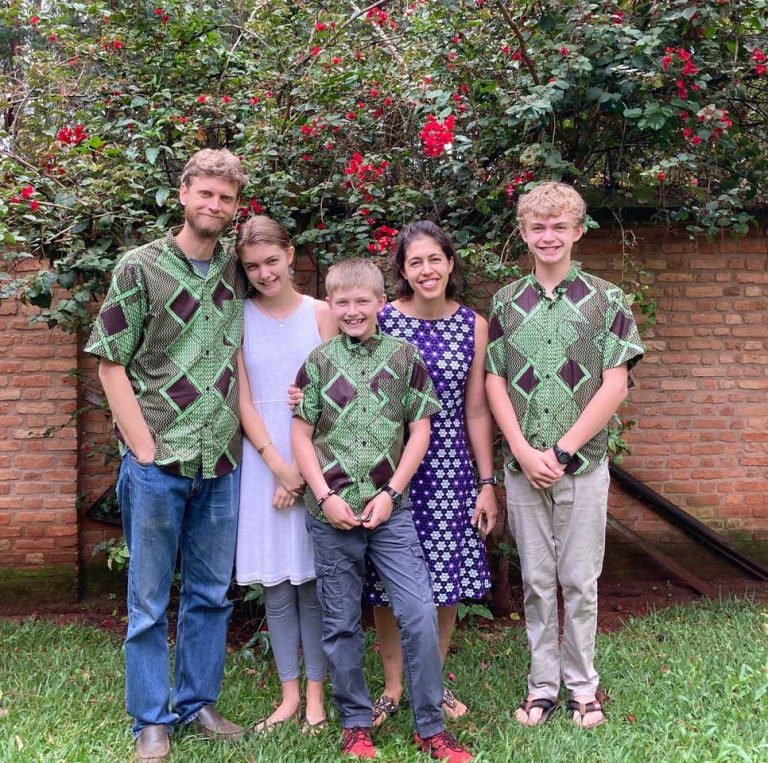Global Presence: Teaching and Healing in Sub-Saharan Africa
Rachel (Selle) McLaughlin ’05 is an obstetrician-gynecologist living in Burundi at a Christian mission hospital and medical school with her husband and three children.

How did you decide to become a missionary in a global center?
I developed an interest in international medicine and mission work in high school. My husband, Eric, and I were both medical students when we met; I was a at Loma Linda University (LLU) and he was at the University of Michigan. We had a common interest in medical missions. After I moved to Michigan to get married, we became friends with two other medical couples interested in the same work and decided to move overseas together. A few months after graduating from my OB-GYN residency in 2009, I took my boards, we sold our house, and prepared to move to Kenya. Through the organization Samaritan’s Purse, we spent two years at Tenwek Hospital and really enjoyed the group dynamic of being with other families. We were able to process things together, support each other, provide child care for date nights, and have other social interactions, which was a blessing. After a couple of years, while searching for other opportunities to serve, our community heard about a new Christian medical school in Burundi that was just beginning, but had no clinical faculty. The school was also trying to develop an older rural missions hospital into their training site at the same time. Eric and I first visited in 2010 and were excited about the opportunity to provide medical education and work with Burundian partners. So after completing our time at Tenwek, we completed a year of French language study and moved to Burundi with our team in 2013. So we’ve been here for over 10 years now!
What do you hope to do?
We are very excited about education of African nationals, mostly in the form of medical students but also nursing staff and now residents. When we arrived in country, there were only 300 doctors for a population of over 10 million people. Ten years later, our team has been a part of training over 300 new physicians, working in every province of the country and also many other countries around Africa. While the medical student teaching is rewarding, our ultimate goal is to establish post graduate training/residency programs, allowing for more in-depth teaching to a small number of people. This also allows for deeper mentoring and discipling relationships. Our hospital started a Pan African Academy of Christian Surgeons (PAACS) program in 2022 (which LLU is the accrediting body for) and we hope to open a family medicine program within the next year as well.
How does your mission call further the healing and teaching ministry of Jesus?
I really feel like our team helps to usher in the Kingdom of God. As Jesus says in Luke 4, he proclaims good news to the poor, news of freedom and healing and the Lord’s favor. We’ve been in Africa for 15 years now, and feel like Kibuye Hospital is a place that not only heals the sick but provides redemption to the people around us. It helps our neighbors feel God’s love for them, knowing that they are not forgotten.
Share a couple of patient stories.
The culture places a high value on motherhood. Much of the culture is highly centered around children and childbearing. Women who have no children, for many reasons including infertility, miscarriage/pregnancy loss, and infant or child loss, feel desperate to have children. I use my skills to restore them and to help with grief and loss, and hopefully help them to feel seen and heard. One woman during her previous pregnancy had experienced fetal loss at eight months gestation due to placental abruption secondary to large fibroids. When she lost her first baby, I induced the nonviable fetus and performed myomectomy of the fibroids. After healing from the surgery, she became pregnant again, and this past Thursday I delivered her first live baby! Such a wonderful feeling watching the new mother with her precious child. But, that same week we had a death on service creating this juxtaposition of the joyful and the sad, a new birth and a death. The lady who died was just 18 years old and arrived critically ill due to sepsis after a C-section. She died a few days later, never having fully regained consciousness. It’s a blessing to be in this community and experience the joyful moments in the midst of the sorrowful ones.
What does your hospital and/or local community need most?
We are so grateful to work at a hospital with Burundian leadership, but it’s still a struggle to find well qualified staff to help with our work. We are constantly under-staffed, and many nurses and doctors aren’t able to get higher levels of training to improve their skill set. Like many African countries, Burundi suffers from “brain drain,” with people initially leaving the country to get further training and then not returning home. Even within the country, we often lose employees to opportunities in the capital city, which offers higher pay and better education for their children. So, what we really need are better training opportunities and more mentoring here at Kibuye. There is so much work, need, and sick patients, and not enough time to get it all done. The facility has developed tremendously in the past 10 years. However, training and mentoring the qualified personnel to staff the hospital is painstakingly slow.
What is the hardest thing for you right now?
Monthly maternal mortality meetings. There are 15 to 20 maternal losses per year. Each one feels like a failure to me, and I carry the weight of that responsibility. There are things we can’t do. We cannot fix everything, and sometimes I feel all alone. Yes, I have community support, and I’m also grateful for the family medicine and surgery teams that do assist me. But I have no OB colleagues out here, and that can be lonely. It’s frustrating when I feel like I don’t have the time, the ability, or the support to be able to elevate the standard of care, and do more to prevent those maternal deaths.
What’s the most fulfilling Aspect?
Helping patients get through pregnancy or loss is fulfilling. I also find it fulfilling working with and training the Burundian general practitioners on my service. I’m close to several GPs and have had the opportunity to mentor them as well as teach them ultrasound and surgical skills.
What would give you a sense of community and support from “home”?
I’m always excited to hear news from LLU, to hear other missionary stories, and to meet up with others in the mission field. I recently met up with Mark E. Reeves ’92, PhD at a PAACS surgery conference in Kenya, and I’ve continued to connect with Ryan A. Hayton ’05 and others as well. That provides a sense of connection with home. Of course, we have so many wonderful supporters and friends back in the U.S. who continue to reach out and encourage us.
What would you like to communicate back to alumni?
Support is needed for our global mission work! Financial support is, of course, always needed, but also equally important, or perhaps more important, is feeling a sense of encouragement, acknowledgment, and prayers from “home.” Really, we want for alumni from home to reach out and provide encouragement to us in the mission field. That would mean the most to us!
Published in the Summer 2024 ALUMNI JOURNAL.


